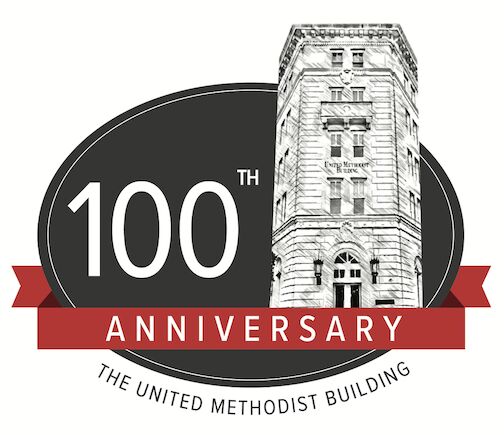ON THIS DAY… South African Archbishop Desmond Tutu at the United Methodist Building to Discuss Angola
On May 20, 1993, Archbishop Desmond Tutu, head of the All-Africa Council of Churches, held a press conference in the United Methodist Building, following his meeting with President Clinton the day before, to express his excitement and hope for United States recognition of a new Democratic government in Angola.

On May 19, 1993, President Bill Clinton at the beginning of his Oval Office meeting with South African Archbishop Desmond Tutu, announced that the United States would recognize the new government of Angola establishing ties between the two nations for the first time in more than a decade.

“I want to discuss a decision that I know has been very important to Bishop Tutu and to other leaders for democracy and human rights in Africa,” said President Clinton. “Today I am pleased to announce the United States recognition of the Government of Angola.“ Read President Clinton’s full comments here.
The decision represented a dramatic evolution in American foreign policy — from outright hostility toward Angola and attempts of undermining the Government throughout the 1980’s, to the Clinton Administration’s diplomatic embrace.
For its part, the Angolan Government led by President Jose Eduardo dos Santos of the Popular Movement for the Liberation of Angola (MPLA), moved away from a rigid dictatorship protected by thousands of Cuban troops to a democratically elected Government in 1992. Santos also accepted a United States-backed peace proposal with outward support from Archbishop Tutu and other African leaders.
“I’m thrilled with the Angola announcement,” said Archbishop Tutu. “Part of my responsibility as head of the All-Africa Council of Churches is to urge that democratic governments in Africa are recognized and that progress in democratization is encouraged.”
AFTER THE FIRST DEMOCRATIC ELECTION, CIVIL WAR CONTINUED
Recognizing the Government and ruling party of Angola in 1993, the Clinton Administration also called on the opposing party, the National Union for the Total Independence of Angola (UNITA), to join the newly elected government and engage in talks to end the civil war.
UNITA refused to support the new government. They accused the leading party of election fraud and resumed civil war fighting that lasted nine more years in Angola.
On February 22, 2002, the death of UNITA leader Jonas Malheiro Savimbi eventually led to negotiations between UNITA and the government, resulting in a peace agreement that brought an end to a 27-year civil war in April of 2002.
The civil war in Angola spawned a disastrous humanitarian crisis, internally displacing over 1 million people. Over 500 thousand people died. The United Nations estimated in 2003 that 80% of Angolans lacked access to basic medical care and 60% lacked access to water. The war devastated Angola’s infrastructure and severely damaged public administration, the economy and religious institutions.
ANGOLA TODAY
Angola continues to operate as a democratic nation with a population of approximately 32 million people.
MLPA won its fourth consecutive post-war elections in 2022, which are held every five years. Political tensions remain high as MLPA has been the ruling party since the country gained independence from Portugal in 1975.
Angola has rebuilt its economy since the end of its civil war in 2002. Through exports of natural resources, especially oil, which accounts for 60% of the country’s GDP and 90% of its exports, development has improved a little. Most Angolans live in poverty as the government continues efforts to strengthen political institutions, infrastructure and economic diversification to support economic growth, job creation and poverty reduction.
THE UNITED METHODIST CHURCH IN ANGOLA
The United Methodist Church was established in Angola on March 18, 1885, by Bishop William Taylor, accompanied by a missionary group of 45 people, most of them lay people with various professions from the United States.
This past March the United Methodist Church in Angola celebrated one hundred and thirty-nine years of existence in ministry.
After the leadership of seven missionary Bishops serving at different times in Angola from 1885 -1972, a new era began in the history of the United Methodist Church, with the election of Angola’s first native Bishop on October 21, 1972 — Bishop Emílio Júlio Miguel de Carvalho (1972-2000).
With the expansion of Methodism in the Eastern part of the country, a second Angolan Bishop was elected to lead the Church in that region in 1988, Moisés Domingos Fernandes (1988-2000). At that time, Angola expanded into two Annual Conferences (Eastern and Western Angola).
Bishop José Quipungo was elected to the episcopacy in 2000. He is the Resident Bishop of East Angola Area, which includes the Eastern Angola Conference in the Africa Central Conference of The United Methodist Church.
Bishop Gaspar João Domingos, elected to the episcopacy in 2000, is the Resident Bishop of the West Angola Area, which includes Western Angola Conference in the Africa Central Conference of The United Methodist Church.
At Church and Society, Rev. Manuel João André, Western Angola, serves on the Board of Directors, was on the Revised Social Principles (RSP) Task Force and a member of the RSP Africa editorial team.
United Methodist Building Anniversary Resources
To watch four new United Methodist Building video shorts “Celebrating 100 Years of Social Witness,” and for information on the year of celebration click here.

To purchase the 2024 United Methodist Building historical book written by Dr. Jessica M. Smith, For Justice and Enduring Peace: One Hundred Years of Social Witness, visit Cokesbury Publishing.
ON THIS DAY SERIES… Each month in 2024, Church and Society will highlight notable days offering glimpses into the momentous 100-year history of the United Methodist Building and the people called Methodists often walking along side ecumenical partners living their faith through social witness.